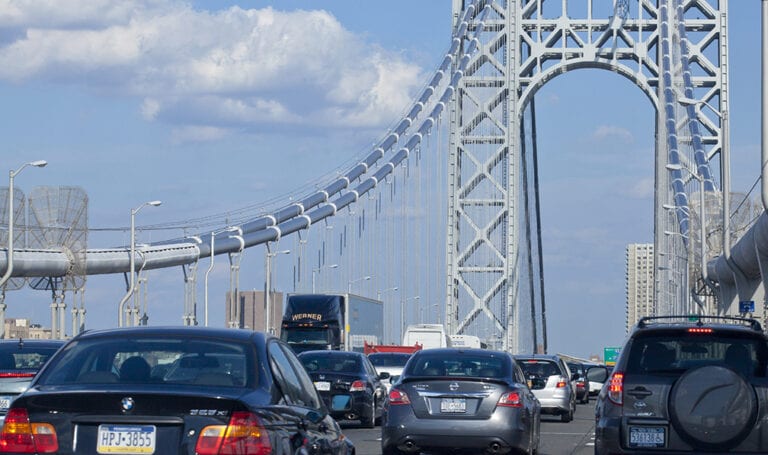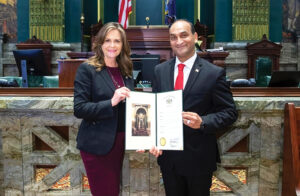ARLINGTON, Va. —The vehicle miles traveled (VMT) tax has surfaced as a possible funding mechanism to prop up the Highway Trust Fund (HTF) and potentially contribute to funding for much-needed infrastructure projects. However, a new report from the American Transportation Research Institute (ATRI) has assessed the VMT tax as “complicated” and “costly.”
On March 17, ATRI released “A Practical Analysis of a National VMT Tax System,” which examines the technology required, costs and implementation of a fee-based system.
“It’s clear that a VMT tax is a far more complicated and costly replacement for the fuel tax than many had anticipated,” said Jim Burg, president and CEO of Michigan-based James Burg Trucking Co. “If a system like this is going to work for everyone, many years of thoughtful planning and federal leadership are needed.”
A VMT fee that would impose a widespread tax or per-mile charge for all vehicles has been tossed around as a possible option to help maintain the nation’s highways, along with plans that are swirling around regarding funding an infrastructure package.
The HTF is currently the primary source of generating revenue to improve U.S. roadways, with nearly $40 billion acquired from a per-gallon federal tax on motor fuels to power automobiles and trucks.
As inflation steadily increases, the HTF, which is forecast to run out in 2022, faces shortfalls as federal fuel tax rates have not been increased since 1993. A VMT tax is being explored by federal officials as an option to generate revenue for transportation and infrastructure. At a briefing in February, U.S. Secretary of Transportation Pete Buttigieg noted that the federal tax on motor fuels has not been increased since 1993, and the HTF has not been solvent since 2008.
“The gas tax is not a long-term solution (for regaining HTF solvency) anyway,” Buttigieg said. “I don’t think that is where energy will be in this administration, especially as there are so many different (funding) possibilities on the table, like user-pay through a VMT (vehicle miles traveled) fee.”
The tax could potentially decrease road usage and reduce emissions on the environment. And, depending on the amount of the per-mile rate, the VMT tax could raise any amount to cover infrastructure costs.
But it comes with a price.
“The federal government spends about $70 million to collect the federal fuel tax of $35 billion. But the new VMT program will probably cost $13 billion or more to manage,” said Dan Murray, senior vice president of ATRI. “There’s a whole bunch of reasons, but mostly, it’s because federal fuel tax today isn’t really paid by you and me; it’s paid by about 270 fuel terminal operators.”
The VMT tax program could move fuel tax revenue collection from fewer than 300 federal taxpayers to 272 million vehicle accounts. Each account would have to transfer from individual bank accounts to the federal government.
The transfer of funds would come with a cost, too. Forty percent of collection costs for a federal VMT tax would be 300 times more expensive than collection costs for the federal motor fuels tax, according to ATRI’s report. It is expected the annual financial transaction cost could be as high as $4.3 billion.
“However much money you want or need, you have to charge users 40% more, because that is the VMT collection cost,” Murray said. “The amount of money that’ll go back to infrastructure will be a relatively small percentage of what the federal fuel tax returns are to infrastructure.”
To break it down, the national VMT tax program could face other realities — millions of vehicles or households will be unable to participate in a national VMT tax program due to obsolete vehicles or inaccessibility to bank accounts, internet transactions or cellular coverage, according to the ATRI report.
While the government could provide dongles (small plug-in electronic devices) to track mileage, the cost would reach $13.6 billion and does not address other related issues, and any evasion to the VMT would cost $7.87 billion annually.
Additionally, urban areas could generate far more revenue than rural systems under the VMT, although rural roadways cover far more miles and provide connectivity between urban areas.
Another challenge in the VMT tax program is convincing the public that the tax is “fair, unintrusive and cost-efficient,” according to ATRI’s analysis.
So far, state trucking associations are opposing the program.
In preparing for President Joe Biden’s infrastructure package, the Owner-Operator Independent Drivers Association (OOIDA) urged the U.S. Senate against a truck-only VMT tax. If a truck-only VMT charge was proposed, only truck drivers would pay the tax.
“We believe it makes no sense to single out an industry that already has a stable funding mechanism in place,” wrote Todd Spencer, CEO of OOIDA, in a letter to the Senate. “If Congress would like to properly address diminishing HTF returns, it must be honest about the driving force behind them. Rather than singling out trucks, you should start by ensuring passenger vehicles are also providing stable and reliable revenue for our highway infrastructure.”
Spencer also noted that a truck-only VMT tax might require additional mandatory legislation on electronic logging devices (ELD) to track miles.
Several state trucking associations have also expressed disinterest in supporting a truck-only VMT fee.
“We are against a VMT on trucks only. It’s discriminatory; it’s an unfair business practice,” said Allen Hodges, president of the Idaho Trucking Association. “Idaho is the fifth highest registration state in the nation for trucks. Out of all the annual highway numbers driven in Idaho, trucking represents only 12% of those miles, but we pay over 40% of the state annual highway budget.”
According to 2019 figures from the Bureau of Transportation Statistics, out of 276.4 million registered motor vehicles in the U.S., only 1% are commercial trucks.
According to ATRI, applying the VMT charge to one vehicle type “would apply to a small subsection of the overall vehicle population.”
“Trucking believes in good roads and wants good roads,” Hodges said. “We just believe that whatever the fee structure is needs to be fair and equitable and cost-effective. A VMT would take five to 10 years just to recoup all the expenses of studying up the system. You could go five to 10 years without any money towards the roads because it all went to new staff, new computers and technology.”
Hodges said increasing the fuel tax, including electric car taxes, might supplement the expiration of the Highway Trust Fund. However, ATRI reports that fuel tax receipts measured in dollars per mile of travel have dropped steeply in recent decades, with “insufficient revenue to maintain, let alone expand, the road network.”
The fuel tax has fallen due to inflation without the tax being increased. In addition, fuel-economy improvements and electric cars that are exempt from the fuel tax have impacted the decline.
“This VMT concept is appealing to people in a theoretical standpoint, but from a practical viewpoint, doesn’t work well,” said Gregory Fulton, president of the Colorado Motor Carriers Association. “It’s in a situation where the cost of collecting is much greater than something like that of a fuel tax. The difficulties in collecting this information and setting up a system like that is extremely challenging.”
Fulton’s biggest concerns are about tax evasion and privacy — meaning, the public may refuse to report mileage due to privacy issues — or the information could be vulnerable to hackers.
In a Mileage-Based User Fee report from the New York Department of Transportation, privacy was considered the “largest impediment to implementing a VMT tax.”
“It’s not ready for primetime,” Fulton said. “When you look at trucking, we have probably one of the more efficient and effective type systems when it comes to fuel tax collection, as well as registration fees. It’s almost a model out there for exchanging fees and funds. It’s auditable, it doesn’t involve substantial infrastructure like this (VMT) would involve. It doesn’t involve (issues like) privacy.”
Hannah Butler is a lover of interesting people, places, photos and the written word. Butler is a former community newspaper reporter and editor for Arkansas Tech University’s student newspaper. Butler is currently finishing up her undergraduate print journalism degree and hopes to pursue higher education. Her work has been featured in at least nine different publications.











